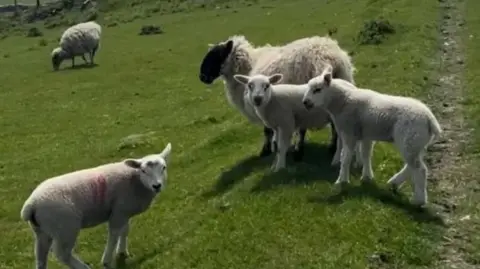No rise in bluetongue risk due to TT - minister
 BBC
BBCIncreased visitors over the TT period "do not fundamentally increase the risk" of bluetongue reaching the island, the Environment, Food and Agriculture minister has said.
On Sunday restrictions were placed on the movement of some livestock in Lancashire, including cattle and sheep, following the discovery of the virus in the county.
A Manx ban on livestock imports has been in place since November 2023 to prevent bluetongue, which can cause infertility and breeding problems in animals and can be fatal.
Clare Barber said while cases of the virus in the Lancashire area were "concerning", it was spread by midges and not carried or transmitted by people or equipment.
While additional visitors would not increase the risk of the spread of bluetongue, the main "potential route" would be from imported susceptible animals or midges blown across from England, she said.
MLC Gary Clueitt questioned whether restrictions had been placed products used in the artificial insemination of livestock in line those implemented in the UK,
Jason Moorhouse MHK raised concerns about infected midges or larva being brought to the island on visitors' camping equipment.
Awareness
Barber said there were still permissions for reproduction products to be imported but it was "the only way" the island could diversify its livestock population.
The government had put a "huge amount of precautions in", but there came a point "where we have to acknowledge that we are doing all we can short of closing our borders permanently", she said.
She told Tynwald members foot and mouth disease cases in Europe had also prompted restrictions on the importation of meat and dairy products for personal use from anywhere other than Great Britain.
Posters had been placed in the island's airport along with the Heysham and Liverpool ferry ports warning travellers of existing restrictions ahead of the TT races.
Similar information would also be placed in Dublin and Belfast ports, she said.
Information on the risks of leaving food where livestock could eat it, and more widely on foot and mouth disease, has been shared with local commissioners, TT campsites, community organisers and farmers.
The TT was cancelled in 2001 following outbreaks of foot and mouth disease in the UK.
But Barber she said her department currently considered the risk of the disease reaching the island to be "low" as there was no direct travel from Eastern Europe, which was where the latest cases had been identified.
Read more stories from the Isle of Man on the BBC, watch BBC North West Tonight on BBC iPlayer and follow BBC Isle of Man on Facebook and X.
